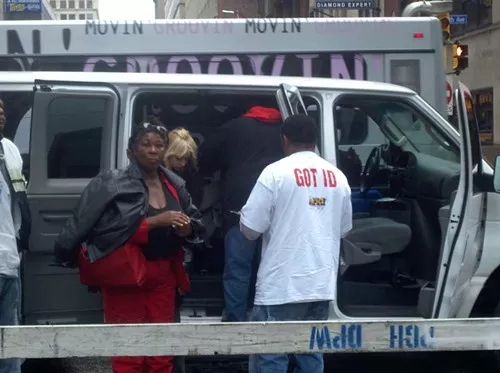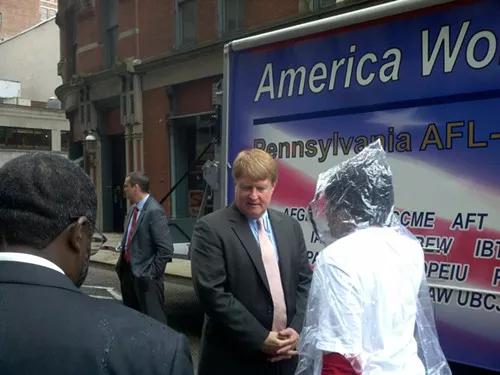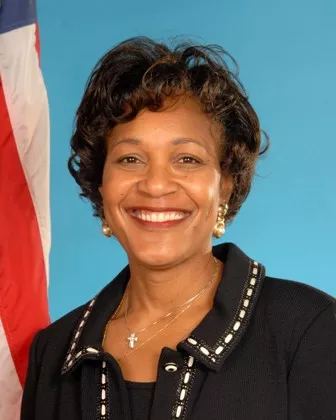Tuesday, January 22, 2013
A state judge ruled today that a trial to determine the constitutionality of Pennsylvania's voter identification law will be held this summer.
In a scheduling order handed down today, Commonwealth judge Robert Simpson set the following timetable for the case: the trial will start at 10 a.m., July 15, at the Pennsylvania Judicial Center in Harrisburg and expected to last a week. The plaintiffs in the case against the state want to fully stop the law. The ACLU of Pennsylvania, one of the plaintiffs, has said they will ask the court to extend a preliminary injunction, which barred the law from being used in last November's General Election.
In today's order, Simpson stated that any motion for another preliminary injunction is due by Feb. 8, and that he will rule on it by March 21.
As we noted in this week's edition, the last preliminary injunction only applied to the General Election. Currently, the law is on the books and active meaning that without further intervention, voters will be required to show a form of photo identification in the May primary.
Tuesday, October 2, 2012

- darylmetcalfe.com
This region's bastion of "good government," Republican Daryl Metcalfe of Cranberry Township has released a statement on the voter-ID bill. Here's a synopsis: He's pissed off, and therefore we are all treated to the highest levels of his self-righteous indignation.
Metcalfe was the primary sponsor of the bill.
"Justice Simpson’s final decision is out of bounds with the rule of law, constitutional checks and balances for the individual branches of state government, and most importantly, the will of the people. Rather than making a ruling based on the constitution and the law, this judicial activist decision is skewed in favor of the lazy who refuse to exercise the necessary work ethic to meet the commonsense requirements to obtain an acceptable photo ID."
And he doesn't stop there. He also fires off a few shots at Gov. Tom Corbett for acquiescing to us lazy good-for-nothings by offering an easier-to-get ID.
It is also beyond the scope of executive authority for the Corbett administration to create a new Department of State unsecure voting ID that is not provided for under current law set forth by the legislative branch.
And in case you didn't get it the first time, Rep. Metcalfe again thinks you're lazy.
Justice Simpson and the Corbett administration have chosen to openly enable and fully embrace the ever-increasing entitlement mentality of those individuals who have no problem living off the fruits of their neighbors’ labor.
While he didn't mention Metcalfe by name, Vic Walczak, legal director of the American Civil Liberties Union of Pennsylvania, noted that one of the bill’s main sponsors had been calling people opposed to voter ID lazy.
“We would ask him to look at the testimony of the people who came to court … and the incredible efforts they went to [to get photo IDs]," Walczak said. “These are people who greatly value the right to vote …. For some politician to get up and call them lazy is beyond offensive.”
Metcalfe's full release appears after the jump.
Tags: Voter ID , Pennsylvania , Daryl Metcalfe , Image
OK, this just in: Commonwealth Court Judge Robert Simpson has just issued a ruling that scraps the voter ID requirement in the November elections. Just as happened in the spring primary, voters will be asked for a photo ID that meets state requirements... but not required to present it.
Simpson's ruling does not throw out the law completely, but it does the next best thing. Under the state law, voters who came to the polls without IDs would be allowed to complete "provisional ballots," but those votes would not be counted unless the voter could provide adequate identification six days after the fact. Simpson's ruling tosses that requirement. Instead, his ruling would extend the "transition provisions" used in the spring, when poll workers would ask for, and inform voters about the need for, photo IDs. Extending that requirement, Simpson wrote, would retain the law's overall scheme, without invoking the burdensome process of verifying a provisional ballot.
"I will enjoin enforcement of those provisions ... which amend the provisional ballot procedures of the Election Code and cause disenfranchisement based on failure to present photo ID for in-person voting," Simpson wrote. "The injunction will have the effect of extending the express transition provisions of Act 18 through the general election."
UPDATED: There's been some confusion from other media outlets on this point, but our reading of Simpson's decision -- and that of the ACLU -- is that provisional ballots will not be needed for voters who lack ID. One of the "transition provisions" named in his ruling is that voters who showed up at the polls during the spring primary need NOT use provisional ballots.
Simpson agreed with the law's challengers that, while the state had made numerous efforts to streamline the ID-application process, with just five weeks to go, "I question whether sufficient time now remains to attain the goal of liberal access." In fact, he wrote, "any new deployment will reveal unforeseen problems which impede implementation."
While Simpson declined to toss the law out — its terms will apply to future elections — the law's opponents are calling it a win.
Stay tuned.
We are still going through the VOter ID decision that was handed down just a short time ago, but wanted to share the link to Judge Simpson's ruling.
Judge Simpson granted the injunction in part:
Petitioners’ Application for Preliminary Injunction is GRANTED in part. Based on the foregoing Supplemental Determination, the Respondents and their agents, servants and officers are hereby PRELIMINARILY ENJOINED from:
1) Requiring that a registered elector must apply for a PennDOT product prior to the elector’s seeking issuance of a free DOS ID; and
2) Implementing or enforcing that part of Act 18 which amends Section 1210(a.2) of the Election Code, 25 P.S. §3050(a.2), and Section 1210(a.4)(5)(ii) of the Election Code, 25 P.S. §3050(a.4), for the general election of November 6, 2012. It is the intent of this Preliminary Injunction to extend the transition procedures described in Section 10(1) of Act 18 beyond September 17, 2012, and through the general election of November 6, 2012. Nothing in this Preliminary Injunction shall preclude the Commonwealth from following transition procedures described in Section 10(2) of Act 18 (relating to additional education efforts to those not showing proof of identification for in-person voting) for the general election of November 6, 2012. All other provisions of Act 18 remain in effect.
We will have more as the day rolls on.
Tags: Pennsylvania , voter ID , voter suppression , election
Thursday, September 20, 2012
Guess what? It turns out that County Executive Rich Fitzgerald might be some sort of ninja.
I say that because of a press conference Fitzgerald held late this morning, in which he announced that the county would be issuing its own voter IDs for those who had trouble getting them from the state. Fitzgerald is apparently pulling some serious jujitsu here by using the law's own provisions against its suspected intent -- making it hard for Democratic constituencies to make it to the polls.
"Our job is to make [voting] easy," Fitzgerald told reporters. "Our job is to make voting accessible."
To obtain the county ID, you must already be a registered voter, and you must have some proof of identification. But the requirements are the same as existed statewide until VoterID requirements were established this year. They include: a non-photo ID issued by the state or federal government, a gun permit, a current utility bill or bank statement, or a paycheck or -- for all you 47 percenters out there -- government check.
Tuesday, September 18, 2012
After hearing oral arguments on the VoterID bill last week, the state Supreme Court, in a 4-2 decision, has decided ... not to decide. At least not yet.
In an unsigned opinion, the court's three Republican judges joined with Democrat Max Baer to send the case back to Commonwealth Court Robert Simpson for another hearing. This time, though, the ruling requires Simpson to ensure that the state's issuance of ID cards "comport[s] with the requirement of liberal access which the General Assembly [required]
[I]f the Commonwealth Court is not still convinced ... that there will be no voter disenfranchisement arising out of the Commonwealth's implementation of [the Voter ID law] for purposes of the upcoming election," the ruling continued, then Simpson "is obliged to enter a preliminary injunction" that would bar the law from taking effect this November.
In other words, unless the state can convince Simpson that no one is losing their access to the polls, the law is being shelved until after the election.
"It's a very tough standard," David Gersch, who argued against the law before the Supreme Court, told reporters during a conference call. And the Supremes, he noted, instructed Simpson not to take government officials' word for it. "We are not satisfied with a mere predictive judgment based primarily on the assurances of government officials," the ruling held, "even though we have no doubt they are proceeding in good faith."
ACLU attorney Vic Walczak, who was also on the conference call, said that such language shifted the burden of proof from the plaintiffs to the defendants -- which is why Simpson may very well not come to the same conclusion he did last time, when he denied the motion to put the law on hiatus.

The “My Vote, My Right” rally outside sponsored by the AFL-CIO was in full swing by 10:30 Tuesday morning with several people already going through the process of getting a new or renewed ID card.
Officials say about four large van loads of registered voters had already been brought downtown to the Smithfield Street driver's license center location with many more planned throughout the day. A volunteer assisting voters inside the facility said the wait times weren't too bad — about 10 to 20 minutes.
Some citizens did report some surliness on the part of PENNDOT workers and City Paper saw very few smiles on workers' faces. Outside, though, the mood was more upbeat. As people came out with their new IDs, they were given a t-shirt and met with smiles.
Organizers and those in attendance were pleased that things were running smoothly, but still not happy to be doing it at all.
"That we have a restrictive law like this is sad," said Nolan Harrison, a former Steelers player and Senior Director of Former Player Services for the NFL Player's Association. "I'm out here because we have members of our union, players form the 1950s and 1960s and even young players, who could be denied the right to vote.
"Our parents and grandparents could be denied their voice and there's something wrong with that."
Allegheny County Chief Executive Rich Fitzgerald, who also stopped b the rally Tuesday morning, called the voter ID law a "huge waste of resources."

However, he said, the law may not wind up having the outcome that Republicans hoped it would.
"Honestly, I think this has energized people," Fitzgerald said. "When you try to deny people their right to something they'll come back and fight even harder for it."
The rally and Voter ID assistance will continue until 4:15 today.
Tags: Voter ID , Pennsylvania , AFL-CIO , Rich FItzgerald , 2012 election , Obama , Romney , Image
This morning, a coalition of labor groups, civil-rights activists, and others are gathering outside the state Department of Motor Vehicles office at 708 Smithfield Street Downtown — the first stop in a statewide campaign to raise awareness of the state's Voter ID law. Among those in attendance is Arlene Holt Baker, the executive vice president of the AFL-CIO. City Paper spoke with Holt Baker late last week about how Voter ID changes the election's dynamic — and what unions are doing about it.

Why is the AFL-CIO getting involved in this? It's not strictly a "union issue."
We certainly believe a strong democracy has the ability for citizens to cast their votes, and we also believe that in order to have a strong democracy, you have to have a union that gives you a voice. The very same states that have introduced these laws have been states to introduce bills to weaken the voice of workers. It's an interesting thing — that voter suppression and taking the right of workers in the workplace, the immigrant-bashing, all seem to go hand-in-hand.
Although Tom Corbett hasn't gone out of his way to provoke fights with organized labor on things like prevailing-wage bills, the way some other Republican governors have. Why do you think that is?
I can't say why he hasn't done it. It's still a union town when you think about the state. But he certainly keeps company [with anti-labor Republicans], and supports the philosophy.
How has voter ID changed the way the AFL-CIO is organizing for this election?
It gives us another opportunity to show that these folks, who would try to suppress your vote, are not on your side as working people. Instead of them trying to figure out how to create jobs, it's, "How do we figure out a means to ensure that less people participate in the vote?" We can do the comparison, and show whose side these folks are on.
Ironically, though, if that works out as you hope, and if you have a ground game that works, it could be that there are comparatively few problems on Election Day — which will prompt Voter ID backers to say, "See? The law wasn't such a big deal after all." How would you respond to that?
I don't think there's any way that this will prove to be the right path to take. They've done it under the guise that there is voter fraud, and voter impersonation. But that does not exist. Even under the Bush administration, they only found 87 cases out of millions and millions of votes cast. People are not going in, impersonating others casting a vote. We know that its intent was to diminish the number of people of color, young people, and the poor. Because that is the coalition that elected Barack Obama.
What do you think Election Day will be like this year?
What I certainly hope it looks like, is that no matter what the outcome in the courts [on a legal challenge to the Voter ID law], you're going to see tremendous turnout. I think people are fired up. I think turnout numbers are going to be good. Because I think people are not going to sit back and be denied.
Thursday, September 13, 2012
The state's controversial Voter ID law came before the state Supreme Court today, and observers seem to agree ... the state did not have an easy time of it.
Two Democrats on the Court's current 6-member roster -- Seamus P. McCaffery and Debra McCloskey Todd -- seemed openly hostile to the measure. "Could it be politics?" McCaffery asked about the motivations behind the bill, raising House Majority Leader Mike Turzai's now-infamous remarks that the law would help Mitt Romney win the state in Novemeber. Both he and Todd asked state lawyers, "What's the rush?" They noted that the state had previously acknowledged that it had no evidence that fraud was likely in the coming election.
Wednesday, August 15, 2012
"It's not the evidence. It's the standard of review."
So said Penda Hair, one of the attorneys who sought to topple the state's Voter ID bill, of a Commonwealth Court ruling upholding the law. That may sound like the legal equivalent of the Pirates blaming an 11-0 loss on a badly drawn strike zone. But Hair's claim will be the basis for the next court battle.
Hair -- who'd previously called her side's case a "slam dunk" -- and other attorneys spoke with reporters on a conference call a few moments ago. They've vowed to file an appeal of the decision by tomorrow; the Supreme Court could have a ruling in as little as a month, though the timing "is completely up to them," acknowledged attorney Jennifer Clarke.
That appeal will argue that Judge Robert Simpson's ruling erred by applying the wrong standard when reviewing the law.
Hair and other attorneys argued that Simpson should have used the standard of "strict scrutiny" to weigh the facts. "Strict scrutiny" is applied to government action where fundamental rights -- like the right to vote -- are at stake. And it typically puts the burden on the government to prove a law is necessary. Given that attorneys for the state had already acknowledged a near-total lack of evidence of voter fraud, Hair and others felt confident that they would prevail using a "strict scrutiny" yardstick.
"That just goes to show that you should never predict what a court is going to do," Hair said sheepishly.
Simpson's ruling invoked a 2008 US Supreme Court ruling, rulings in other cases, and a nearly century-old Pennsylvania case, to give state legislators broad deference in drafting bills. (As for House Republican Leader Mike Turzai's notorious claim that the measure would help elect Mitt Romney this Novemeber? Simpson, while calling the remarks "disturbing," shrugged them off: "I declined to infer that other members of the General Assembly shared the boastful views," he wrote. And anyway, he added, if there are valid reasons for a law, dubious motives on behalf of those who back it don't necessarily invalidate it.) That put the burden on plaintiffs seeking to topple the law.
"If strict scrutiny applied in this case," explained ACLU attorney Vic Walczak, "the government would have to say, 'We really really need this law because of 'x.'" Instead, "When you're dealing with the lower-level scrutiny that the court applied here, the burden is much more on the individuals."
Indeed, Simpson quoted precedents that Simpson's ruling acknowledges that "if strict scrutiny is to be employed, I might reach a different determination."
Or not. Other portions of Simpson's ruling seem hostile to some of the evidence presented by Walczak's side. As noted here earlier, Simpson suggested plaintiffs had inflated estimates of the number voters lacking ID, rejecting expert testimony on the potential law's impact. And while Simpson credited the lawyers for doing "an excellent job of 'putting a face' to those burdened by the voter ID requirement," it wasn't good enough.
"I am not convinced [those who testified] will not have their votes counted in the general election," he wrote.









